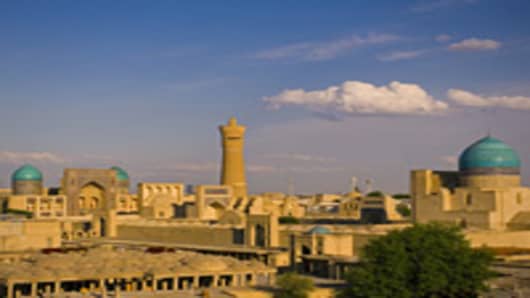As I write this, four of my colleagues remain wrongfully detained in an Uzbekistan prison.
Their crime? Just showing up for work.
While my company fights for their release and the survival of our business, I hope that our story serves as a cautionary tale for those investors and companies contemplating business in Uzbekistan.
Sadly, after eight years of operating perhaps the most successful and largest business in Uzbekistan, we have become a target of harassment by nefarious Uzbek authorities. On August 13, 2012, following unsubstantiated accusations of financial impropriety, the wrongful detention of employees and the unwarranted suspensions of our licenses, an Uzbek court granted a government petition to withdraw our license to do business in Uzbekistan.
Who are we, and why does this matter?
Mobile TeleSystems, or MTS, , is the largest telecommunications provider in Russia and Central Asia. More than a quarter of our company is owned by institutional investors based in the United States, a who’s who of state pension funds, teacher retirement funds and leading asset management firms. As a NYSE-listed company, we subscribe to the highest levels of corporate governance, mandated by US regulators, and we pride ourselves on delivering open and transparent business practices in each and every country we operate. Since 2004, MTS has successfully operated without incident in Uzbekistan through its wholly owned subsidiary Uzdunrobita, the market leader with 38% share, providing mobile communications and Internet access to more than 9.5 million Uzbeks.
While it is no surprise that Uzbekistan presents a challenging business environment, the climate for foreign investors has recently become increasingly toxic. This is of particular concern, considering $500 million in foreign direct investment from the U.S. has entered that country in the last 20 years. We are only the latest in a growing list of companies, including Coca-Cola, Newmont Mining , Oxus Gold PLC and Metal-Tech Ltd., which have fallen victim to capricious forces within the Uzbekistan government in the last 10 years.
MTS has long complied with local regulations through regular audits administered by various government agencies. Never have any serious violations been reported; during the latest audit, completed last February, covering the period 2007-2010, tax authorities found that we owed an additional 2.4 billion Uzbek soms ($1.27 million) in taxes and penalties. While we disagreed with this finding, we quickly settled the issue in full.
Still, just a few short months later, the Uzbekistan government arrested five of our employees on the vaguest of charges, denying them even the minimum procedural rights prescribed by Uzbek law or international human rights conventions. While one has been released from the same detention center to which the United Nations has been denied entry, he had remained under effective house arrest until his repatriation late last week. Other employees in the country have also had their passports confiscated and are being routinely harassed by authorities to sign false confessions. Our bank accounts in Uzbekistan have been frozen. And on August 13, 2012, in a hastily convened 20-minute proceeding, the Uzbekistan authorities revoked our operating licenses.
In effect, the Uzbek government is trying to steal more than $1 billion in MTS assets. (Read More:MTS facing fines of $80 million in Uzbekistan)
While the financial and legal aspects of this case will get sorted with time, ultimately, it's Uzbekistan’s own citizens who are truly suffering. With the cancellation of MTS’s licenses, more than 9.5 million Uzbeks were left without mobile and internet connections. The remaining telecom service providers in Uzbekistan are not prepared to meet the sudden demand, and the outage has caused severe disruptions to people’s daily lives and business activities. This has a serious impact not only on families, small businesses and large corporations, but also on international interests and the region’s future. Meanwhile, as part of its campaign to escalate pressure on MTS and identify pretexts for regulatory actions, Uzbek authorities have detained four MTS employees illegally. (Read More: Russia's MTS set to return to Turkmenistan)
As was disclosed recently, a letter authored by the U.S. Commission on Security and Cooperation in Europe, or the U.S. Helsinki Commission, was delivered to the attention of Uzbek President Islam Karimov regarding the plight of our colleagues. This comes in conjunction with a visit by U.S. Assistant Secretary of State Robert Blake, who traveled last week to Uzbekistan as part of the countries’ annual bilateral consultation. It is our hope that these events will shine a light on U.S. interests in the country, including MTS’ investors. And we are also encouraging US-based and European investors to exert their ownership interests by supporting our efforts to urge the government of Uzbekistan to respect the rights of its citizens and the rule of law by expressing their concern to elected officials.
Although risk is a natural part of any investment, companies should not have to worry about the use of intimidation tactics, which threatens their existence and basic rights of their employees. Shareholders of global companies who care about open and transparent business practices and wish to protect their investment should hold accountable those governments that resort to outright thuggery to punish companies who play by the rules.
It’s time to send a powerful message to the Uzbek authorities – and other governments that think they might be able to get away with the same deplorable practices – that the systematic harassment of international investors will not be tolerated.
Dr. Michael Hecker, Vice President of Strategy and Corporate Development, Mobile TeleSystems . Hecker joined MTS in May 2006. Prior to joining MTS, Mr. Hecker worked at A.T. Kearney Europe from 2000-2006, focusing on strategy, marketing and finance in European telecommunications and consumer goods industries. Prior to that, he worked as a Junior Lawyer in Berlin and Brandenburg, Germany.


